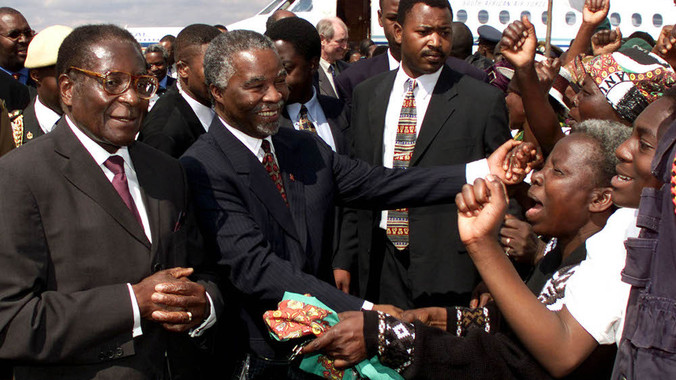EDITORIAL COMMENT: Mbeki letter exposes UK machinations

Elsewhere on these pages, we carry a letter written by former South African President Thabo Mbeki and published yesterday on his foundation’s website, which reveals sensational details of a plot by Britain and the United States of America to effect regime change in Zimbabwe. Titled, ‘South Africa’s Policy Towards Zimbabwe – a Synopsis’, the article lays bare the extent to which former British Prime Minister Tony Blair and his Labour party government were prepared to go to topple President Robert Mugabe and replace him with a pliant leader and government of their choice. In a candid recollection of events which took place when Zimbabwe embarked on the fast track land reform programme at the turn of the millennium, Mbeki said Britain was planning a military invasion to remove the Zanu-PF government from power.
He said pressure was being exerted on South Africa and other neighbouring countries to co-operate with Britain on its plans to oust President Mugabe and Pretoria had acted as a bulwark against the UK’s nefarious plot and thwarted it.
“There were others in the world, led particularly by the UK, who opposed our approach of encouraging the Zimbabweans to decide their future. These preferred regime change – the forcible removal of President Mugabe and his replacement by people approved by the UK and its allies,” Mbeki said.
“This is what explained the sustained campaign to condemn us for conducting the so-called ‘quiet diplomacy’. What was wrong with ‘quiet diplomacy’, which led to the adoption of the GPA was that it defended the right of the people of Zimbabwe to determine their future, as opposed to the desire by some in the West to carry out regime change in Zimbabwe and impose their will on the country”. He said in the period preceding the 2002 Zimbabwe elections, the UK and the US in particular were very keen to effect regime change failure to which they would impose various conditions to shorten the period of President Mugabe’s tenure.
“Our then Minister of Intelligence, Lindiwe Sisulu, had to make a number of trips to London and Washington to engage the UK and US governments on their plans for Zimbabwe, with strict instructions from our government to resist all plans to impose anything on the people of Zimbabwe, including by military means,” said Mbeki.
“Accordingly it was not from hearsay or third parties that we acquired the knowledge about Western plans to overthrow President Mugabe, but directly from what they communicated to a representative of our government”.
Mbeki went on to quote the November 11, 2007 edition of the UK newspaper, The Independent on Sunday, which reported that during its interview of Lord Guthrie, the former Chief of Defence Staff of the UK armed forces, it learnt that “astonishingly, the subjects discussed (with Prime Minister Tony Blair) included invading Zimbabwe, “which people were always trying to get me (Guthrie) to look at. My advice was, ‘Hold hard, you’ll make it worse’.” The former South African president also took an extract of John Kampfner’s book, Blair’s Wars, in which Blair is quoted as telling his International Development Secretary Claire Short that “if it were down to me, I’d do Zimbabwe as well – that is send troops.” In his Memoir, A Journey, Blair also explained that the reason he could not “get rid of Mugabe” which he “would have loved to” was because “it wasn’t practical (since…the surrounding African nations maintained a lingering support for him and would have opposed any action strenuously).” We are outraged by the condescending attitude of the Blair regime and hold it responsible for the breakdown of relations between Zimbabwe and the UK.
It is now clear that the Labour government was negligent in its handling of the land question in Zimbabwe and must shoulder all the blame for the country’s political and economic challenges which spanned more than a decade.
As Mbeki writes, when war veterans and others began to occupy white-owned farms, South Africa intervened to encourage the UK government to honour the commitment that had been made at Lancaster House in 1979 to give the government of Zimbabwe the financial means to carry out the required land redistribution in a non-confrontational manner.
“Unfortunately, contrary to what the Conservative Prime Ministers Margaret Thatcher and John Major had agreed, Tony Blair’s Secretary of State for International Development, Claire Short, repudiated the commitment to honour the undertaking made at Lancaster House”, he said. Zimbabwe is therefore vindicated in embarking on the land reform programme and taking all the necessary steps to protect its sovereignty and territorial integrity in the face of naked aggression by the West.
The fact that Britain and its allies were prepared to use military force to effect regime change exposes their bullyboy tactics and neo-colonial mentality. Mbeki’s revelations should spur Zimbabweans to remain vigilant and jealously guard their independence.
We applaud him for his resolute stance in ensuring that Zimbabweans are left alone to resolve their internal matters.









Comments